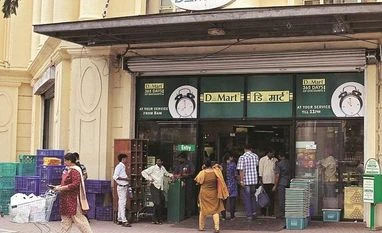The stock of Avenue Supermarts (Avenue) surged over 3 per cent in intraday trade on Monday before closing with a 1.6 per cent gain at Rs 1,905.95 apiece, on a day the BSE Sensex was up 0.62 per cent. Strong growth in top line in the December 2019 quarter (Q3) and an even higher increase in operating profit amid a challenging consumption scenario enthused the Street.
The company, which operates the DMart retail chain of supermarkets in India, announced its Q3 numbers on Saturday. Some analysts, however, now also believe that the pace of growth in top-line may decline further, and margins and return ratios may have peaked. And, this could have implications for the stock.
Good showing in Q3
Despite some moderation in same-store-sales growth (according to analysts estimates as the company does not disclose this parameter) amid slowing consumption in the country, Avenue’s net sales grew about 24 per cent year-on-year (YoY) to Rs 6,752 crore, better than the growth clocked in the September quarter. Profit before tax was up 25.9 per cent YoY to Rs 497.3 crore in Q3. These two figures were ahead of estimates of Rs 6,651 crore and Rs 478 crore, respectively, according to Bloomberg’s poll of analysts. Same-store-sales growth indicates the increase in sales from stores in operation in the comparable period.
Strong top-line growth, along with a 31 basis point increase in gross profit margin (thanks to better product mix and repricing), helped the company post an over 30 per cent rise in Ebitda or earnings before interest, tax, depreciation and amortisation. Q3 was the third consecutive quarter of Ebitda outpacing top-line growth. The Ebitda margin, excluding IND-AS 116 impact (new lease accounting norms), expanded by 16 basis points YoY, to 8.5 per cent (8.8 per cent on a reported basis), mainly driven by the improvement in the gross profit margin.
Net profit growth of 53.3 per cent YoY to Rs 394.3 crore was largely on account on lower corporation tax rates announced in September last year, and hence may not be truly comparable.
Some analysts are sceptical of the company being able to sustain its growth and margins amid the rising competitive intensity from players like Amazon. For instance, analysts at JM Financial say: “The current level of profitability can possibly be taken to be at steady-state unless competitive dynamics change for the worse here onwards.”
However, that may not be the case. DMart’s operating margin expansion (excluding accounting impact) of 16 basis point YoY was driven by the expansion in the gross margin, while selling, general and administration expenses grew 26.8 per cent, about 300 basis point higher than the growth in revenue. Those at Edelweiss Securities say: “Increased competition in the retail space is likely to make incremental margin expansion a challenge.”
Jay Gandhi and Rutvi Chokshi of HDFC Securities, too, are sceptical on Avenue’s prospects. “We remain sellers on the counter as we believe 1) DMart’s throughput, cost and working capital efficiencies are near peak; 2) cost of retailing is inching up; 3) well-capitalised e-grocers/online biggies (Amazon /Flipkart) are getting price-war-ready as can be seen from the significant bump up in their authorised capital,” they note.
What though plays in favour of the company is its everyday-low-cost strategy, which aims at procuring goods at competitive prices, and Avenue’s price leadership position in the market. Moreover, the company has been consistently adding new stores. After adding 20 stores during April-December 2019 (versus just 9 in the comparable year-ago period), Avenue’s total store count stands at 196 as of December 2019. The average size of the recently added stores is also larger at 55,000 - 65,000 sq ft versus around 35,000 sq ft earlier. This could also be a reason for the limited gain in the Ebitda margin as the increased store area may not be garnering revenue in the initial phase, even as costs like electricity may have been incurred on it. So, as the space utilisation improves, it could add to Avenue’s growth in the medium-term.
Therefore, Avenue mustn't miss either on growth or margin expectations of analysts, as the same could impact its return profile, as well as the stock’s performance, given its pricey valuations of 67 times FY21 estimated earnings. Some analysts, such as those at
HSBC, though believe that DMart’s optically expensive valuation builds in long-term annualised earnings growth of around 18 per cent, which they say is fairly achievable.
Unlock 30+ premium stories daily hand-picked by our editors, across devices on browser and app.
Pick your 5 favourite companies, get a daily email with all news updates on them.
Full access to our intuitive epaper - clip, save, share articles from any device; newspaper archives from 2006.
Preferential invites to Business Standard events.
Curated newsletters on markets, personal finance, policy & politics, start-ups, technology, and more.
)